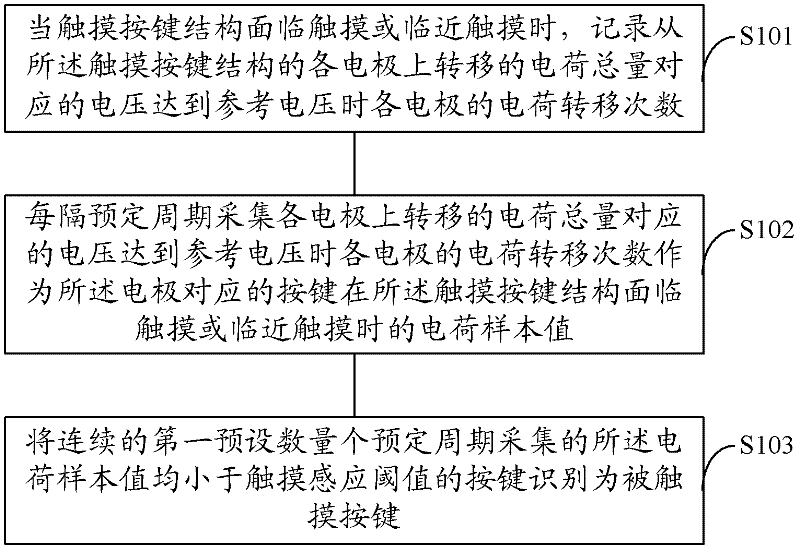Touch recognition method, device, spatial mouse and control method thereof
A space mouse and identification method technology, applied in the direction of instruments, electrical digital data processing, electrical components, etc., can solve the problems of touch operation errors, affecting users' use, unable to identify which button belongs to, to prevent jitter and improve operating experience , to avoid the effect of false triggering
- Summary
- Abstract
- Description
- Claims
- Application Information
AI Technical Summary
Problems solved by technology
Method used
Image
Examples
Embodiment 1
[0045] figure 1 It is a schematic flowchart of the touch recognition method provided by Embodiment 1 of the present invention. Such as figure 1 As shown, the touch recognition method includes:
[0046] Step S101, when the touch button structure is facing a touch or near touch, record the number of charge transfer times of each electrode when the voltage corresponding to the total amount of charge transferred from each electrode of the touch button structure reaches a reference voltage;
[0047] Step S102, collect the charge transfer times of each electrode when the voltage corresponding to the total amount of charge transferred on each electrode reaches the reference voltage every predetermined period, as the charge of the button corresponding to the electrode when the touch button structure is facing touch or near touch sample value;
[0048] Step S103 , identifying the keys whose charge sample values collected for a first preset number of predetermined periods in succes...
Embodiment 2
[0086] The difference between this embodiment and Embodiment 1 is that the touch sensing threshold in the touch recognition method in Embodiment 1 is set according to the actual situation, and generally can be set as a fixed value, while in this embodiment, the touch The sensing threshold is related to the long-term average (LTA, Long Term Average) of the charge sample value within the first preset time period. The long-term average value refers to the average value of charge sample values of multiple predetermined periods sampled within a period of time.
[0087] As described in Embodiment 1, after the charge sample value is sampled, the keys whose charge sample values are all smaller than the touch sensing threshold within a first preset number of consecutive predetermined periods are identified as touched keys. However, in different environments, all aspects are very complicated, and what the capacitive touch device detects is not always related to the user touching the...
Embodiment 3
[0095] Compared with the foregoing first or second embodiment, this embodiment also includes a determination of triggering a proximity sensing event. As described in Embodiment 1, when each electrode in the touch key structure generates a source electric field after charging, the source electric field is an electrostatic field, and forms a charge accumulation area on the surface of each electrode, the triggering of the touch sensing event is due to When a metal button is touched, the electric field distribution will change, which will cause the transfer of charges in the charge accumulation area, so that the charge amount in the charge accumulation area will change, and once a severe charge occurs in the charge accumulation area of a certain electrode If the amount changes, it can generally be considered that a touch operation has occurred on the key corresponding to the electrode. Specifically, the charge sample value of the charge accumulation area corresponding to the key...
PUM
 Login to View More
Login to View More Abstract
Description
Claims
Application Information
 Login to View More
Login to View More - R&D
- Intellectual Property
- Life Sciences
- Materials
- Tech Scout
- Unparalleled Data Quality
- Higher Quality Content
- 60% Fewer Hallucinations
Browse by: Latest US Patents, China's latest patents, Technical Efficacy Thesaurus, Application Domain, Technology Topic, Popular Technical Reports.
© 2025 PatSnap. All rights reserved.Legal|Privacy policy|Modern Slavery Act Transparency Statement|Sitemap|About US| Contact US: help@patsnap.com



